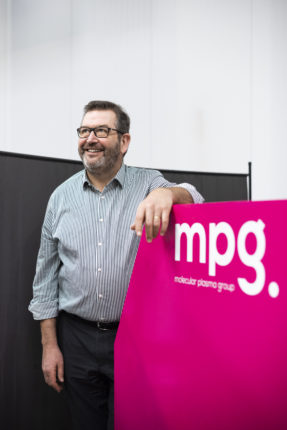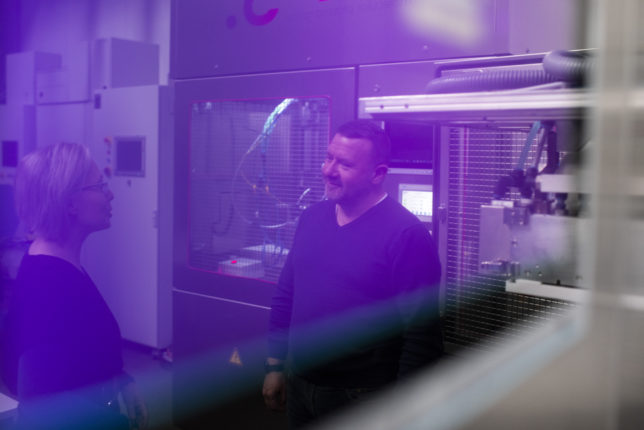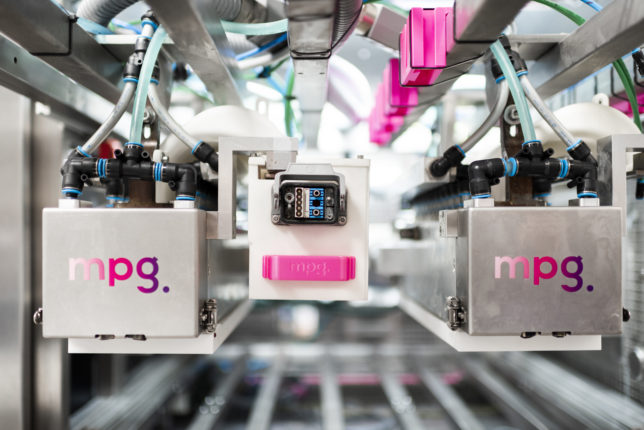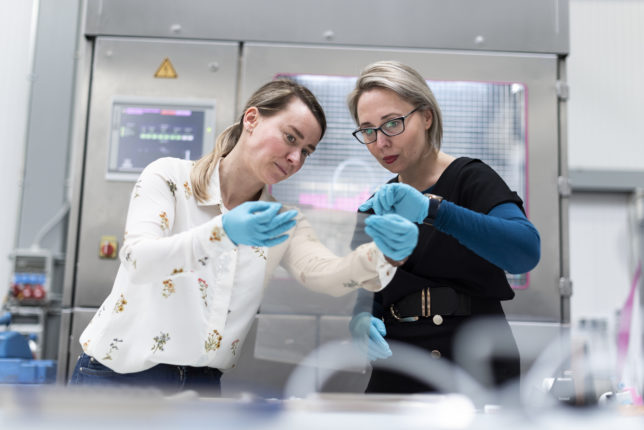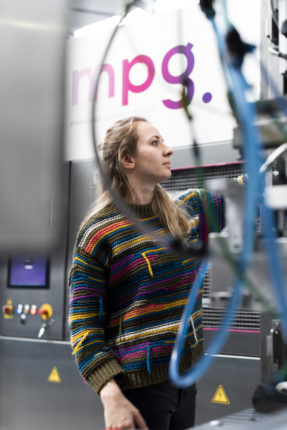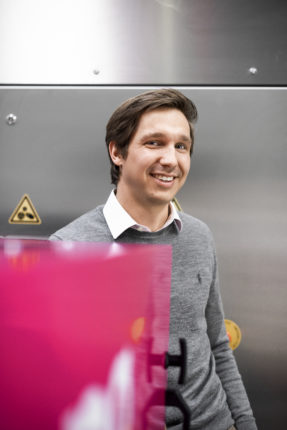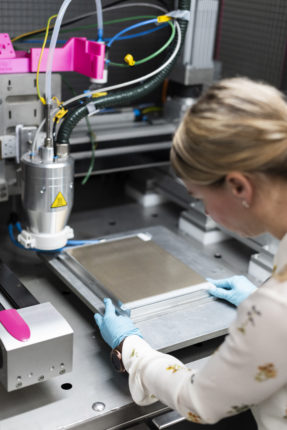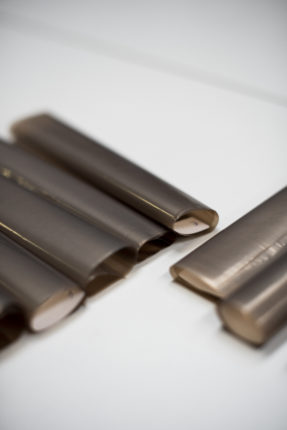Molecular Plasma Group (MPG) was in the media spotlight during the Covid pandemic when the start-up company developed a virucidal plasma coating for the fabrication of face masks “Made in Luxembourg”. Now that the pandemic is over and local mask production is no longer an issue, MPG is again focusing on furthering its technological developments and marketing its innovative solutions, which are applied in a wide variety of fields, thereby benefiting from the learnings of the Covid experience.
Molecular Plasma Group was created in 2016 as a spin-off from the Luxembourg Institute of Science and Technology (LIST) and the Flemish institute for technological research (VITO) and is specialised in surface functionalisation technology, particularly in the field of adhesive bonding for industrial and consumer applications and the immobilisation of biomolecules in the healthcare domain. Both fields of application rely on nanocoating technology using cold atmospheric plasma in a one-step dry process.
When the Covid pandemic broke out in early 2020, the company’s core business, which was focused on adhesion applications for the automotive and aerospace industries in particular, strongly reduced or even came to a halt as a result of the respective lockdowns and the economic downturn. MPG came up with the idea to develop a virucidal coating for face masks and initiated a first proof of concept in cooperation with the LIST. This was a logical next step based on initial experiences with antibody deposition developed in cooperation with KU Leuven and further expanded as a logical consequence of MPG’s participation in the Fit4Start Healthtech programme in 2018.
The urgency of the situation, coupled with the co-financing of the Ministry of the Economy and the support of LIST, accelerated latter development and brought the technology quickly to industrial maturity, in cooperation with the Hôpitaux Robert Schuman: self-disinfecting medical facemasks produced thanks to MPG’s one-step dry coating process.
This breakthrough of an innovative, local solution to fight against Covid-19 has undoubtedly enabled the company to gain credibility, to bring its technology to industrial maturity, to optimise the process in terms of in-line quality measurement and to continue the search for new applications.
Today, Molecular Plasma Group offers its surface functionalisation technology to worldwide customers from a wide range of sectors: automotive, aerospace, electronics, healthcare, advanced composites, packaging, paper, natural fibre, technical textiles, …. This large variety of applications is possible as MPG’s technology enables the use of an extremely wide range of precursor molecules, and it can be used with virtually any substrate imaginable. The surface enhancement is accomplished with the combination of plasma and an application-specific organic chemistry. The plasma activates both the surface as well as the molecules, which are then covalently bonded together. This results in a permanent modification of the chemical functionality of the treated surface which remains stable for a very long time.
As general use case, the solution developed by MPG avoids the drawbacks of organic-solvent-based primers: long waiting times in the process, high process variability, environmental as well as health and safety concerns, waste generation, etc. By grafting a functional nanolayer onto the substrate thanks to the solvent-free MolecularGRIP™ technology, it becomes possible to replace the primers with a fully automated process, including immediate in-line inspection, reduced waste, thus optimizing the process and resulting in substantial cost savings for the customer. Their MolecularGRIP™ technology can, for instance, improve metal-to-polymer adhesion. Thanks to MPG’s one-step solution, no preparation is required, and a UV-tracer is co-injected for quality control.
In several respects, the one-step dry process developed by MPG is considered as an environmentally friendly technology. The surface enhancement process does not use any toxic solvents, as do other technologies commonly used. Then, the functional chemistry usage rate is extremely low, as only a few millilitres of chemistry are needed to functionalise a 100 m² surface. This usage rate is 100 to sometimes even 1000 times lower than with conventional wet chemical methods. Finally, the technology uses very little energy and is a near-zero emission process. These eco-friendly aspects have resulted in the technology being awarded in 2022 the prestigious “Solar Impulse Efficient Solution” label, attributed by Bertrand Picard’s Solar Impulse Foundation after a neutral expert assessment, recognising both the environmental performance and the economic viability of the process.
Presently, MPG’s team is working on several customised industrial developments that take on average about two years to be finalised in close cooperation with the client. Numerous samples and tests are carried out on MPG’s laboratory equipment at their premises at Technoport in Foetz, featuring, among others, PlasmaSpot® Mini, a mobile R&D system; PlasmaSpot® for R&D activities and small-scale industrial production; or PlasmaLine®, an atmospheric plasma system which is able to continuously and homogeneously treat large surfaces. After successful project scale-up and completion, such a unit can easily be integrated into the customer’s production line.
Marc Jacobs, Executive Chairman of MPG, understands the company as a technology platform that enables disruptive solutions for a wide range of applications. In this regard, the numerous partnerships with international research centres are an essential accelerator for the company’s development. This also means that an important place and budget is dedicated to intellectual property protection, as evidenced by a significant number of patent applications for the MPG developments.
By end of 2022, Molecular Plasma Group signed an exclusive partnership agreement with Socomore, specialised in wet-chemistry-based surface functionalisation solutions. Thanks to this cooperation, MPG’s technology should be commercialised more intensively in the aerospace, defence and railway markets.
In addition to the challenges related to the development of new technological applications, Molecular Plasma Group is facing a number of issues specific to a start-up and the Luxembourg ecosystem. Having occupied since its beginnings premises within the Technoport incubator, MPG will have to find new premises in the near future as per its contract stipulations. Considering that in principle, even without taking into account the current ‘polycrisis’ environment, a manufacturing company needs about 10 years to become self-sufficient and given the price of real estate as well as all the necessary authorisations for industrial installations, finding a new location with production facilities is a tremendous challenge for MPG, a challenge the Ministry of the Economy is well aware of. Stijn Vansant, CEO of MPG, also points out another topic, related to the cash-flow situation: “Even if the subsidies granted in the context of the Covid aid scheme have been very generous, we were obliged to completely pre-finance our development. In addition, we had to cope with very cumbersome procedural steps afterwards.”
The young and dynamic team of MPG presently counts 20 employees, 13 of which are Luxembourg-based in Foetz and 7 people working in the bio-incubator in Leuven, Belgium, namely specialised in biotech R&D. Bringing together the most diverse nationalities, the staff is composed of one third scientists and one third engineers. Both for the engineering team and the salespersons, the ideal background should combine proficiency competences in chemistry and physics. In a job market already under pressure, it goes without saying that these requirements make it very difficult to find the right qualified talents.
